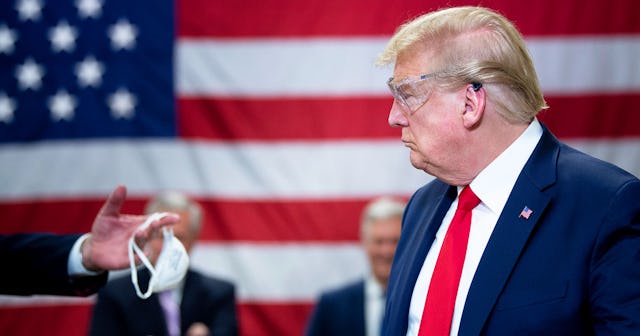The Biggest Spreader Of COVID Conspiracy Theories? The President

New Cornell University study finds that 38 percent of media stories containing COVID-19 misinformation mention Trump
More than 7.2 million cases and over 200,000 deaths later, COVID-19 has devastated the U.S. Globally, the numbers are worse: more than 34 million cases and more than 1 million deaths, according to Johns Hopkins University & Medicine. And since the start of the pandemic in mid-March, Americans have not only had to combat the virus, but also frustratingly and exhaustingly wade through a sea of misinformation online, whether it be the discredited, incredibly harmful viral video Plandemic or countless articles chockfull of false information and conspiratorial claims. But the biggest spreader of COVID-19 conspiracy theories? The president himself.
According to a new study by researchers at Cornell University‘s Alliance for Science, President Donald Trump is, by far, the biggest spreader of COVID-19 false claims. Published Oct. 1, the study examined more than 38 million English-language articles about COVID-19 from Jan. 1 through May 26 — one million of which contained misinformation or disinformation, and 38 percent of which mention Trump within the context of COVID-19 misinformation. According to the researchers, the Trump mentions “made up by far the largest share of the infodemic.”
“We conclude that the President of the United States was likely the largest driver of the COVID-19 misinformation ‘infodemic,'” the study states. “Only 16.4 percent of the misinformation conversation was ‘factchecking’ in nature, suggesting that the majority of COVID misinformation is conveyed by the media without question or correction.”
The study also noted a significant overlap between news coverage of Trump and news coverage of “miracle cures,” a misinformation sub-topic that saw peaks in March, April, and May, with the biggest spike in misinformation in late April when Trump suggested injecting disinfectant to treat COVID-19. Then, later in May, remember when Trump said he finished taking a hydroxychloroquine regimen to ward off the virus? The study highlights that moment, too.
“The biggest surprise was that the president of the United States was the single largest driver of misinformation around Covid,” says Sarah Evanega, the director of the Cornell Alliance for Science and the study’s lead author, per the New York Times. “That’s concerning in that there are real-world dire health implications.”
“The prominent April 24 peak for the ‘miracle cures’ topic dwarfs all other misinformation sub-topics throughout the entire period and therefore deserves particular consideration,” the study states, adding that, “this peak, along with others in the ‘miracle cures’ topic — in particular the president’s promotion of hydroxychloroquine — makes this sub-topic the second-largest contributor to the misinformation conversation after President Trump himself.”
Further, the study also states that the ‘miracle cures’ sub-topic accounts for more misinformation coverage than the other ten misinformation sub-topics combined. Those sub-topics include, in order of most to lease frequent/volume: “New World Order/Deep State,” “Democratic Party Hoax,” “Wuhan Lab/Bioweapon,” “Bill Gates,” “5G,” “Antisemitic Conspiracies,” “Population Control,” “Dr. Anthony Fauci,” “Plandemic,” and “Bat Soup.”
https://twitter.com/jetpack/status/1311708500867846145
The entire study is interesting and worth the read. It further breaks down the baseless conspiracy theories that were spread throughout this pandemic, the important role media professionals play in disseminating misinformation, fact-checking, and more.
“In previous pandemics, such as the HIV/AIDS outbreak, misinformation and its effect on policy was estimated to have led to an additional 300,000 deaths in South Africa alone. If similar or worse outcomes are to be avoided in the present COVID-19 pandemic, greater efforts will need to be made to combat the infodemic that is already substantially polluting the wider media discourse,” the researchers say.
Information about COVID-19 is rapidly changing, and Scary Mommy is committed to providing the most recent data in our coverage. With news being updated so frequently, some of the information in this story may have changed after publication. For this reason, we are encouraging readers to use online resources from local public health departments, the Centers for Disease Control, and the World Health Organization to remain as informed as possible.